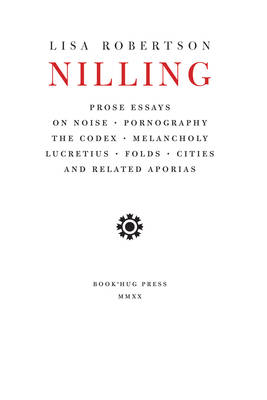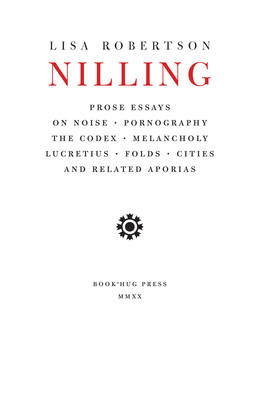
- Afhalen na 1 uur in een winkel met voorraad
- Gratis thuislevering in België vanaf € 30
- Ruim aanbod met 7 miljoen producten
- Afhalen na 1 uur in een winkel met voorraad
- Gratis thuislevering in België vanaf € 30
- Ruim aanbod met 7 miljoen producten
Nilling
Prose Essays on Noise, Pornography, the Codex, Melancholy, Lucretiun, Folds, Cities and Related Aporias
Lisa RobertsonOmschrijving
"I have tried to make a sketch or a model in several dimensions of the potency of Arendt's idea of invisibility, the necessary inconspicuousness of thinking and reading, and the ambivalently joyous and knotted agency to be found there. Just beneath the surface of the phonemes, a gendered name rhythmically explodes into a founding variousness. And then the strictures of the text assert again themselves. I want to claim for this inconspicuousness a transformational agency that runs counter to the teleology of readerly intention. Syllables might call to gods who do and don't exist. That is, they appear in the text's absences and densities as a motile graphic and phonemic force that abnegates its own necessity. Overwhelmingly in my submission to reading's supple snare, I feel love."
Nilling is a sequence of 6 loosely linked prose essays about noise, pornography, the codex, melancholy, Lucretius, folds, cities and related aporias: in short, these are essays on reading. Lisa Robertson applies an acute eye to the subject of reading and writing--two elemental forces that, she suggests, cannot be separated.
For Robertson, a book is an intimacy, and with keen and insightful language, Nilling's essays build into a lively yet close conversation with Robertson's "masters" past writers, philosophers, and idealists who have guided her reading (and writing) practice to this point.
If "a reader is a beginner," then even regular readers of Robertson's kind of deep thinking will delight in the infinite folding together of concepts--the codex, pornography, melancholy, cities--that on their own may seem banal, but in their twisting intertextuality, make for a scintillating study of reading as a deep engagement.
Specificaties
Betrokkenen
- Auteur(s):
- Uitgeverij:
Inhoud
- Aantal bladzijden:
- 96
- Taal:
- Engels
- Reeks:
Eigenschappen
- Productcode (EAN):
- 9781897388891
- Verschijningsdatum:
- 31/03/2012
- Uitvoering:
- Paperback
- Formaat:
- Trade paperback (VS)
- Afmetingen:
- 147 mm x 224 mm
- Gewicht:
- 158 g

Alleen bij Standaard Boekhandel
Beoordelingen
We publiceren alleen reviews die voldoen aan de voorwaarden voor reviews. Bekijk onze voorwaarden voor reviews.











